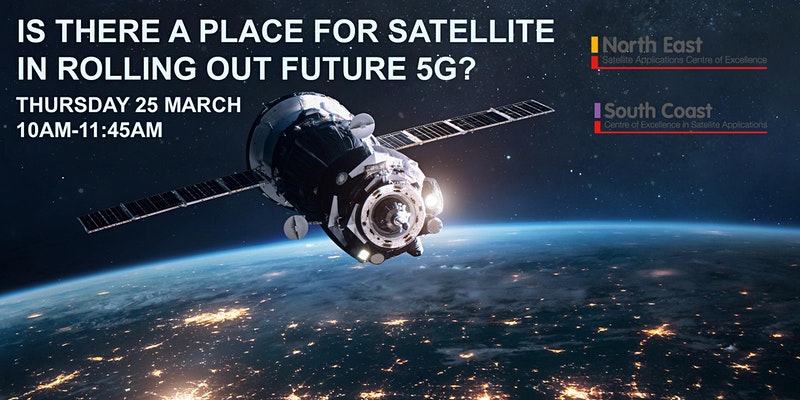
Information:
This event brings together the satellite applications and 5G communities from around the UK with a focus on the South Coast and North East regions. There is a clear common interest between these two areas in the roll-out of 5G; this event provides the opportunity to discuss the topic in more depth.
5G infrastructure is set to provide ubiquitous broadband communication and effective connection networks are now planned to reach rural areas (which in some cases is well overdue). There is a need for innovative and ambitious ideas and the coming together of key stakeholders in the industry to ask what are the current focus areas of research into new 5G technologies – and how can they help to make these new applications a reality? This event will also explore what commercial downstream opportunities are now available via 5G and what we can expect to open up in the coming years?
It is expected that innovation in this sector will benefit from deeper inter-regional linkages, and we look forward to welcoming delegates from both innovative SMEs and larger established companies, as well as academia to explore this further.
Speakers will include:
Kieran Arnold – Director of Ubiquitous Connectivity & General Manager of the 5G Step-out Centre, Satellite Applications Catapult
Rahim Tafazolli – Professor of Mobile and Satellite Communications, Founder and Director of 5GIC, 6GIC and ICS, University of Surrey
Professor Adam Beaumont – Founder and Chairman, aql
John Yates – Satellite Communications Technical Consultant, Regional Centres of Excellence in Satellite Applications
Roger Dewell – Business Development Consultant. South Coast Centre of Excellence in Satellite Applications
Katherine Pearson – Managing Director, Flo-Culture,
Martin Green – Senior Business Development Manager, Cellnex
What is the situation as it stands?
There are many operational satellite systems now in orbit that are able to cover wide areas of the earth. These can provide continuous coverage for areas not well served for broadband communications. Rural areas, in particular, can suffer from communications outages from terrestrial mobile networks when higher-speed data transfer is needed, and 3 and 4g coverage can be limited outside of populated areas.
It is important to mention here that sometimes satellites are not the solution, and recognising that is crucial to the discussion.
The use of 5G is in its early stages in the UK. There is active research into enabling technologies and there are early adopters in the AV/VR and broadcast sectors. New applications are already being considered where large data sets can be visualised using VR, a broadband visualisation technique. But what applications will drive the demand for 5G in the years ahead? Services will only be maintained if there is a business need and user demand for this type of communications infrastructure, so we need to identify this information as soon as possible.
As one of the recent posts on the Forbes website stated :
“5G will foster technologies like autonomous vehicles, virtual reality, and remote surgery and will herald a new era of smart bodies, homes, cities, farms, and cars.”
So, to understand what the need is for widespread coverage of a 5G-standard of communications throughout the UK, we plan to investigate how space can help grow our economy by providing a seamless high-bandwidth connectivity and become a sustainable and vital high-bandwidth business enabler.
Let’s connect and investigate the state of play in the UK, including those companies that are already developing innovative new products and services in a 5G-powered, next-generation economy.